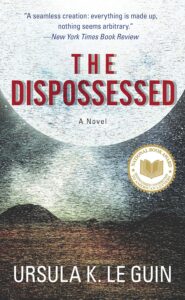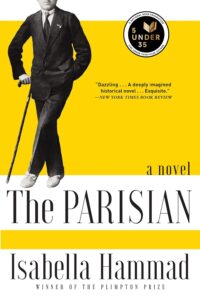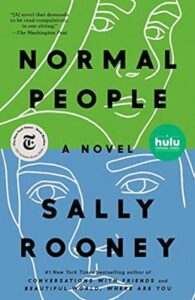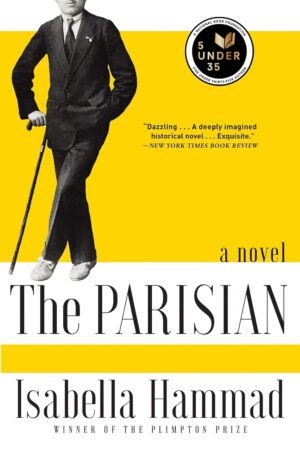I’m deep into my Voyages of the Delphi series, with two books in the series published and another one in the works. If you haven’t read them, they’re about a future in which AI androids have replaced humans and are exploring distant star systems in search of life. In each novel, the protagonists, who are the Delphi’s crew, encounter a moral/social dilemma that tests their value system and puts them in danger.
I’ve been curious about how other authors dealt with social or moral issues while telling a compelling story. In an effort to satisfy my curiosity, I read three novels: Ursula LeGuin’s, The Dispossessed, Isabella Hammad’s The Parisian, and Sally Rooney’s Normal People to see how these three accomplished writers dealt with such issues. What I found was three novels, each of which I can heartily recommend to you for your 2024 reading.
LeGuin’s The Dispossessed was written in 1974, which was when I first read it. I had been a fan of hers for some time, and now, almost 50 years later, I still remember how much her novel made me think. I read it again. LeGuin is a science fiction writer and her novel takes place on twin planets sometime in the future when earth has achieved space travel. It’s not a book about earth or its people, however, it’s about the two planets, Urras and Annares, the former a lush world in which capitalism and nationhood dictate the form and substance of society and the latter, a barren, desert-like planet, whose people, immigrants from Urras, live in a government-less socialist society that celebrates selflessness and the primacy of the group.  The populations of the two planets dislike and distrust one another and have no social commerce. The protagonist, Doctor Shevek, has discovered a revolutionary finding in physics that allows time and distance to be overcome, permitting instantaneous communication between distant planets and perhaps later, even instantaneous travel. He is celebrated on both planets but troubled by the hostility and lack of contact between the two. He is suspicious of the money-oriented, self-seeking philosophy of Urras, but on his native Annares, he has experienced the crushing weight of the majority that chokes the uniqueness and originality of the individual. He travels to Urras as a guest of its most prestigious university and experiences the futility of trying to bring the two cultures together. In the end he has not succeeded but has not given up either. Through the eyes of one man, the physicist, Shevek, we are able to see the pros and cons of two social-political-economic points of view, representing capitalism and idealistic communism, without the author resolving which is better.
The populations of the two planets dislike and distrust one another and have no social commerce. The protagonist, Doctor Shevek, has discovered a revolutionary finding in physics that allows time and distance to be overcome, permitting instantaneous communication between distant planets and perhaps later, even instantaneous travel. He is celebrated on both planets but troubled by the hostility and lack of contact between the two. He is suspicious of the money-oriented, self-seeking philosophy of Urras, but on his native Annares, he has experienced the crushing weight of the majority that chokes the uniqueness and originality of the individual. He travels to Urras as a guest of its most prestigious university and experiences the futility of trying to bring the two cultures together. In the end he has not succeeded but has not given up either. Through the eyes of one man, the physicist, Shevek, we are able to see the pros and cons of two social-political-economic points of view, representing capitalism and idealistic communism, without the author resolving which is better.
Isabella Hammad’s The Parisian, is her first novel, published in 2019, and focusing on the maturation of a young man, Midhat Kamal, from Nablus in Palestine, now the West Bank occupied by Israel. The story begins in 1914 when the protagonist travels to Montpelier, France to study medicine, where he falls in love with a professor’s daughter, drops out of school, then moves to Paris to finish a degree in history before moving back to Nablus.  The opening third of the book, focuses on the intense internal feelings of Kamal as he experiences the indefiniteness of the immigrant’s position in French society, at once treated as an important person, but always with reservations, suspicion, and never as quite an equal. The writing is some of the most beautiful I have read in a modern novel. When he returns to Nablus, disconsolate but resigned to being rejected by the woman he loves, he is immersed in both his father’s business and the social and political life of his town and region. Palestine is as indefinite in its identity as he was in France. Following the defeat of the Ottoman Empire, which controlled the region, the territory was not quite a country, and despite promises of independence, various European powers, principally France and Britain, control its fate and its definition. Fringes of the populace, including some of Kamal’s close friends, rebel, and stage battles for independence, while the majority continue to jockey among themselves for social ascendance. A French priest becomes a central figure and through his eyes, we see a keen understanding of the family and kin-related intrigues, but he fails to see the pride and desire for self-determination that runs alongside of it, especially among the young men, but also among the women and even some of the oldest members of society. Alas, despite their sporadic efforts to take control of their own fate, the Palestinians are treated as pawns by the British, who view them as terrorists while Jewish settlers buy up the land and gradually take over the region. Kamal, when he finds out that the woman in France did not reject him 20 years earlier, but his father concealed her letter from him, descends into severe melancholia and is unable to take care of himself, while his friends and relatives risk their lives to fight for some kind of independence for their land. In the end, which is pre-WWII, nothing is settled except Kamal is becoming rehabilitated and the fate of the region is slipping even further from the grasp of its people. It’s a story that can’t quite decide if it’s about politics or. about the inner life of its protagonist but manages to portray the displacement of identity that both the main character and the population of Palestine experienced at the time.
The opening third of the book, focuses on the intense internal feelings of Kamal as he experiences the indefiniteness of the immigrant’s position in French society, at once treated as an important person, but always with reservations, suspicion, and never as quite an equal. The writing is some of the most beautiful I have read in a modern novel. When he returns to Nablus, disconsolate but resigned to being rejected by the woman he loves, he is immersed in both his father’s business and the social and political life of his town and region. Palestine is as indefinite in its identity as he was in France. Following the defeat of the Ottoman Empire, which controlled the region, the territory was not quite a country, and despite promises of independence, various European powers, principally France and Britain, control its fate and its definition. Fringes of the populace, including some of Kamal’s close friends, rebel, and stage battles for independence, while the majority continue to jockey among themselves for social ascendance. A French priest becomes a central figure and through his eyes, we see a keen understanding of the family and kin-related intrigues, but he fails to see the pride and desire for self-determination that runs alongside of it, especially among the young men, but also among the women and even some of the oldest members of society. Alas, despite their sporadic efforts to take control of their own fate, the Palestinians are treated as pawns by the British, who view them as terrorists while Jewish settlers buy up the land and gradually take over the region. Kamal, when he finds out that the woman in France did not reject him 20 years earlier, but his father concealed her letter from him, descends into severe melancholia and is unable to take care of himself, while his friends and relatives risk their lives to fight for some kind of independence for their land. In the end, which is pre-WWII, nothing is settled except Kamal is becoming rehabilitated and the fate of the region is slipping even further from the grasp of its people. It’s a story that can’t quite decide if it’s about politics or. about the inner life of its protagonist but manages to portray the displacement of identity that both the main character and the population of Palestine experienced at the time.
Sally Rooney’s Normal People, doesn’t really deal with political issues and the only social issue that becomes at least a semi-focus of the story is the status and privilege hierarchy that is built into society and accepted as a given that determines peoples’ lives. The two main characters, Connell Waldron and Marianne Sheridan, are teens in a small town in Ireland.  His mother cleans house for hers. Both sensitive teens, Connell, shy, but competent, athletic, and popular, and Marianne, introverted, tortured, and isolated, the two are the smartest kids in their class and manage to find each other and have a secret and intense sexual and friendship relationship before they both go off to Trinity College in Dublin, where they are spectacular students, and on again, off again lovers and always close friends, although their own insecurities mar every attempt they make to sustain a relationship. Connell’s intellectual and academic accomplishments pull him up by his bootstraps to enable him to overcome the social barriers to someone with his modest background joining the wealthy group that Marianne hangs around with. At all times, their close, often secret, sexual and emotional dependence upon each other help them through each difficulty they encounter, and their other relationships fall by the wayside, though they never seem to see or even seek a long-term permanent relationship with each other. Their money differences, more than any social class or differences in sophistication present one of the main obstacles to their getting together, even at the end of the story, which sees Connell leaving for America to pursue a fellowship while Marianne remains at home presumably still defining herself. Normal People is a hit TV series, which I haven’t seen, but perusing Goodreads, I found that the novel engendered widely different views and levels of appreciation. The characters, to me, were both likeable and easy to identify with, although their relationship was not something I could imagine as real. To be as close as they were, yet as separate and denying about their dependence upon each other was interesting, but sounded completely foreign to me. The amount of casual sex nearly all the teens in the novel engaged in and the amount of their drinking and crude male comments about the girls they dated was equally foreign to me and may reflect my age and the era in which I grew up or something different about Europe and America. The males I knew in high school drank only occasionally, had sex only with their girl friends, if at all, and treated their relationships with respect and importance. But that was small-town USA in the late 1950 and early 1960s.
His mother cleans house for hers. Both sensitive teens, Connell, shy, but competent, athletic, and popular, and Marianne, introverted, tortured, and isolated, the two are the smartest kids in their class and manage to find each other and have a secret and intense sexual and friendship relationship before they both go off to Trinity College in Dublin, where they are spectacular students, and on again, off again lovers and always close friends, although their own insecurities mar every attempt they make to sustain a relationship. Connell’s intellectual and academic accomplishments pull him up by his bootstraps to enable him to overcome the social barriers to someone with his modest background joining the wealthy group that Marianne hangs around with. At all times, their close, often secret, sexual and emotional dependence upon each other help them through each difficulty they encounter, and their other relationships fall by the wayside, though they never seem to see or even seek a long-term permanent relationship with each other. Their money differences, more than any social class or differences in sophistication present one of the main obstacles to their getting together, even at the end of the story, which sees Connell leaving for America to pursue a fellowship while Marianne remains at home presumably still defining herself. Normal People is a hit TV series, which I haven’t seen, but perusing Goodreads, I found that the novel engendered widely different views and levels of appreciation. The characters, to me, were both likeable and easy to identify with, although their relationship was not something I could imagine as real. To be as close as they were, yet as separate and denying about their dependence upon each other was interesting, but sounded completely foreign to me. The amount of casual sex nearly all the teens in the novel engaged in and the amount of their drinking and crude male comments about the girls they dated was equally foreign to me and may reflect my age and the era in which I grew up or something different about Europe and America. The males I knew in high school drank only occasionally, had sex only with their girl friends, if at all, and treated their relationships with respect and importance. But that was small-town USA in the late 1950 and early 1960s.
These were three very different books. LeGuin’s The Dispossesed dealt most directly with social and political issues, and, surprisingly, was no less focused upon the development of its characters than the other two books. Hammad’s The Parisian was so beautifully written, and her beginning description of the tribulations of her character in a foreign society was so well done that I almost was let down when the novel became more focused on the Palestinian political situation. Rooney’s Normal People really wasn’t about social class, but instead about two people who were uniquely sensitive in a way that we all remember from our younger years, though they were originals and, in their closeness, paired with distance, frustratingly painful to read about, but I confess I was more deeply absorbed by Normal People than by either of the others, although I loved them all, and finished Rooney’s book in one day.
What did I learn about writing about social dilemmas? Probably that a good story is about the inner lives of the people in it, whether it is science fiction, classic historical literature, or a tale of modern youthful love.
Interested in scif-fi about AIs solving moral dilemmas in a future that has them exploring our galaxy? Read Casey Dorman’s Voyages of the Delphi novels: Ezekiel’s Brain and Prime Directive. Available on Amazon. Click Here!

Subscribe to Casey Dorman’s Newsletter. Click HERE





